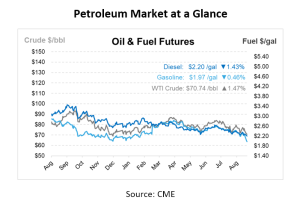
What’s That: Independent Petroleum Association of America
It’s important to know where our oil is produced and who represents and advocates for its production in the United States. More than 90 years ago, President Herbert Hoover held a national and state conference to address the creation of a program to conserve America’s natural petroleum resources. At that historic conference, the Independent Petroleum Association of America (IPAA) was formed by royalty and landowners. In today’s What’s That Wednesday, we will explore what the IPAA is and how it functions in our nation to preserve petroleum production.
What is the Independent Petroleum Association of America?
You might wonder what exactly the IPAA is and what it does for our nation. The Independent Petroleum Association of America (IPAA), headquartered in Washington, D.C., serves as a leading advocate for the oil and gas industry, focusing on exploration and production. As a trade association, the IPAA represents the interests of independent oil and natural gas producers in the United States. It advocates for policies and regulations that support the energy industry, provides industry information and education, and promotes the role of independent producers in energy production and economic development.
The IPAA’s mission is to ensure a viable American oil and natural gas industry, realizing the need for a stable energy source for the American economy. Its primary purpose is to represent natural gas and crude oil producers nationwide by providing educational, economic, and analytical expertise. The IPAA collaborates with 44 independent national, state, and regional organizations, collectively representing thousands of royalty owners and companies that supply goods and services to the domestic sector.
What is the History of IPAA?
Founded in 1929 at the behest of President Herbert Hoover, the IPAA has been a driving force in the oil and gas industry for over 95 years. Since its inception, it has grown into a major organization with thousands of members. For over nine decades, the IPAA’s volunteer leaders have skillfully combined business insight with political expertise to support and advance the independent oil and natural gas industry.
In its early years, the IPAA faced serious challenges. The government was encouraging crude oil imports despite the U.S. having sufficient oil reserves, and policymakers feared a potential shortage of petroleum. The IPAA’s formative years shaped its role and established its ongoing commitment to representing and supporting U.S. oil and gas producers.
How Does the IPAA Benefit the Energy Industry?
The Independent Petroleum Association of America (IPAA) provides news, economic insights, and education on various topics within the energy industry. By offering this information, the IPAA helps the U.S. oil and gas industry gain expert perspectives on current developments and strategies for maintaining production in the United States. Networking and collaboration are influential ways the IPAA benefits the energy sector. Through its knowledge-sharing and educational efforts, the IPAA creates a platform for independent producers to connect, share insights, and collaborate. This networking can lead to business opportunities, partnerships, and solutions to common industry challenges. Additionally, the IPAA supports the industry through its educational resources. It organizes conferences, workshops, and seminars that provide training and updates on industry trends, technological advancements, and best practices. The IPAA also offers valuable data, research, and analysis, helping producers make informed decisions about exploration, production, and market strategies.
Legal and regulatory support is another way the IPAA benefits the energy sector. It assists members in navigating complex legal and regulatory environments, offering guidance on compliance, advocating for regulatory changes, and providing resources to address legal challenges. By working to improve the public perception of the energy industry and advocating for policies that benefit independent producers, the IPAA helps create a favorable operating environment for its members. Overall, the IPAA is imperative in supporting and advancing the interests of independent oil and natural gas producers, contributing to the overall health and growth of the United States energy industry.
IPAA and Energy Prices
International oil prices are rising, leading to higher gasoline and diesel fuel costs. American oil and natural gas producers are working hard to increase domestic crude oil production, which is reaching record levels. This increased production, characterized by lighter and lower-sulfur oil, has significantly reduced the U.S. dependency on foreign oil, especially from OPEC countries. Imports dropped from 60% of total U.S. consumption in 2005 to just 17% now.
American crude oil that can’t be processed domestically is being exported, helping to stabilize global oil prices and providing alternatives to OPEC and Russian supplies for U.S. allies. American refineries, known for their high technology, are also major contributors to the international petroleum products market. Global tensions and supply constraints will influence future oil prices, but the U.S. crude oil production growth over the past five years will help mitigate these impacts.

This article is part of Daily Market News & Insights
Tagged:
MARKET CONDITION REPORT - DISCLAIMER
The information contained herein is derived from sources believed to be reliable; however, this information is not guaranteed as to its accuracy or completeness. Furthermore, no responsibility is assumed for use of this material and no express or implied warranties or guarantees are made. This material and any view or comment expressed herein are provided for informational purposes only and should not be construed in any way as an inducement or recommendation to buy or sell products, commodity futures or options contracts.





